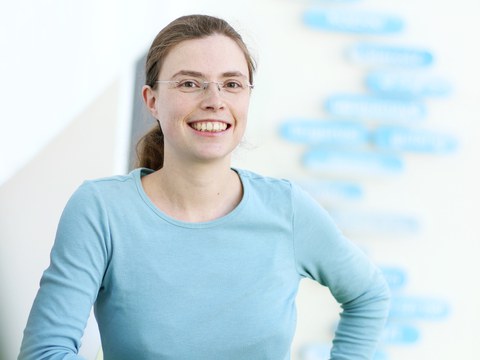Mar 27, 2020
Our Girls' Day contribution with a difference

Dr. Elisabeth Fischer-Friedrich
As a part of TU Dresden, we have been inviting science interested girls to the dedicated Girls' Day for years, introducing them to typical professions in the scientific world such as lab technician, postdoc and research group leader, experimenting with them in the labs and answering their questions about study opportunities at the Center for Molecular and Cellular Bioengineering (CMCB) at TU Dresden with its Master's programs Molecular Bioengineering, Nanobiophysics and Regenerative Biology and Medicine.
We had planned a varied programme for March 2020 and were looking forward to welcoming the girls. But like all other events, Girls' Day had to be cancelled due to the corona pandemic. So this year, the only way we can present one of our female scientists, who the girls would otherwise have experienced live, is by virtual means:
Dr. Elisabeth Fischer-Friedrich, Research Group Leader at CMCB (to which B CUBE belongs) and Cluster of Excellence Physics of Life (PoL) at TU Dresden
Elisabeth, you wanted to introduce us to the cytoskeleton at Girls' Day. What is that?
The cytoskeleton is a polymer network that has a supporting function especially in animal cells including the human cells - similar to the skeleton in our body but within a single cell, hence, on a much smaller scale. Cytoskeleton polymers are chain-shaped molecules that are formed by the assembly of special cytoskeleton proteins. The cytoskeleton plays a major role in shaping the cell and, similar to a muscle, can itself generate forces that bring the cell into a specific shape. This is important for the correct functioning of a cell. In addition, the polymer strands of the cytoskeleton also serve as a kind of internal cell highway system - specialized molecules run along these cytoskeleton highways and transport other molecules from A to B.
How did you come across this research topic?
I am a physicist with a keen interest in biology and started working on biological systems during my PhD thesis. Force generation and mechanical properties are particularly exciting topics for physicists. Therefore I have been working in the field of cell mechanics since my postdoc. In this field of research, we investigate the material properties of cells. Of particular interest is the shape memory of cells and tissue and how forces are generated in them. These material properties are particularly relevant in biology when biological processes involve controlled cell shape changes, such as during embryonic development or simply during cell division. Specifically, we investigate whether cytoskeletal structures behave more like a liquid or a solid and how the molecular structure influences these properties.
You studied physics and also did your doctorate in this subject - what motivated you to do so, and did the low percentage of women in this subject somehow affected you?
I love to solve riddles and get to the bottom of things. That's why it was soon clear to me that I wanted to study a natural science. In physics I was also attracted by the mathematical part and the intellectual challenge. At first I had the idea of going into astronomy or cosmology. During my studies I got to know the relatively young field of biophysics and reoriented myself towards it.
Of course, you stand out as a female physics student, simply because there are relatively few of them. And that has sometimes given me the impression that I should prove myself to my fellow students. But teaching staff never put any obstacles in my way.
You have now been working in science for eleven years - what is it about research that appeals to you?
You can turn your own ideas into reality and be creative in research, and the work definitely has playful aspects. When things are going well, research feels like opening a surprise egg at the end of an exciting riddle. It is especially great when the content of the surprise egg is enthusiastically received by colleagues and applications arise, for example in the field of medicine.
Which of your experiences would you have loved to share with the students on Girls` Day?
On the one hand, I would have liked to tell the girls that I it was no problem for me to study a male-dominated discipline. And that I quickly got used to working primarily with men.
On the other hand, I would have shared that an academic career is a rocky road and is only suitable for those who are absolutely convinced. A researcher needs a high tolerance for frustration and a long breath. You also have to be prepared to work on temporary contracts for many years with an uncertain future, strong pressure to perform and high competition. Almost the only long-term positions are professorships, and these are rare - and the proportion of women here is very low, either.
In addition, the expectations of an academic career in Germany are very difficult to reconcile with parenthood and generally with social ties to other people. A constant willingness to move to other cities and countries is expected. In my opinion, it is precisely this aspect that often leads women to give up in science at some point.
My appeal to girls is: Show the world that women have something to offer. Have great ambitions in your life, even if it may not be put forward by people in your environment". You only have this one life - use it as an attempt to secure a place for yourself in the history books - there are already far too many male names in them.
Thank you, Elisabeth, for this insight into your career and your virtual advice from woman to woman. Let's hope that the exchange of experiences between female scientists and femal students will be possible again live and on site during the next Girls‘ Day on April 22, 2021. The Girls' Day website will provide updates.
